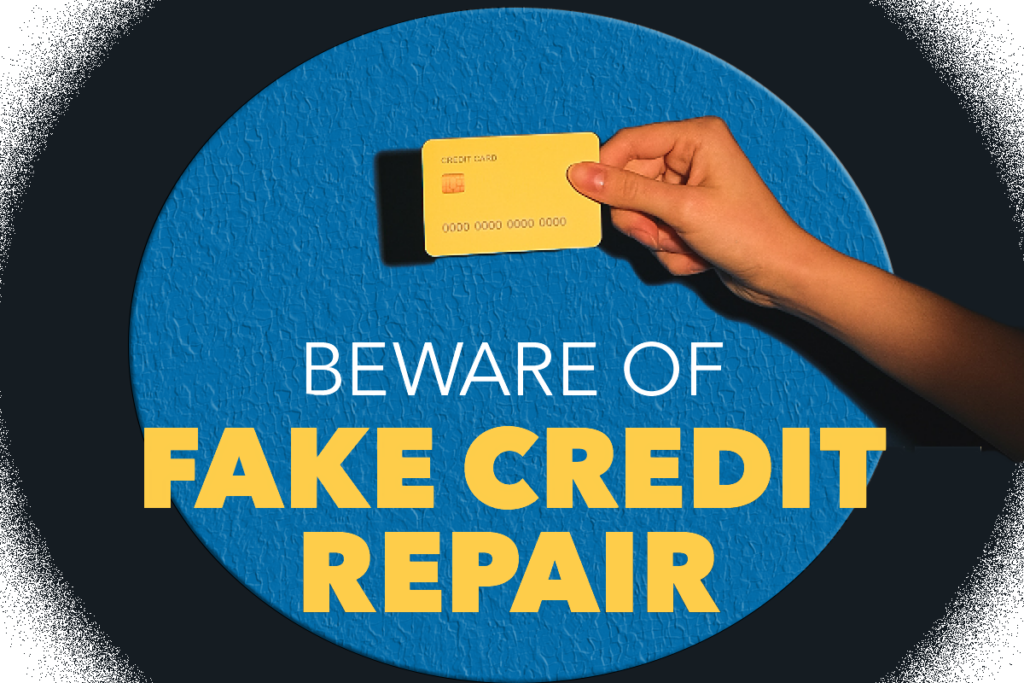Credit repair scams have become increasingly common, with fraudulent companies targeting people who are desperate to improve their credit scores. These scams often promise quick fixes and guaranteed results, but they leave consumers worse off than before. It’s essential to understand how these scams operate and how you can protect yourself from falling victim.
What is a Fake Credit Repair Scam?
A fake credit repair scam involves fraudulent companies or individuals who offer services to “repair” your credit score for a fee, but in reality, they don’t provide any actual help. These scammers often claim to have special tools, techniques, or connections that can erase bad credit, remove negative marks, or boost scores rapidly. In most cases, the only thing they “repair” is their bank account, leaving consumers with no improvement in their credit.
How to Spot Fake Credit Repair Scams
- Too Good to Be True Promises
- Scammers often guarantee that they can improve your credit score in a short amount of time. No legitimate credit repair company can promise a specific score increase or a quick fix.
- Be cautious of promises that claim to “erase bad credit” or “remove negative information” that is accurate and legally reported.
- Upfront Fees
- By law, legitimate credit repair companies are not allowed to charge fees before they perform the service. If a company asks for payment upfront, it’s a red flag.
- Scammers often charge large fees for services that they don’t fulfill.
- Avoidance of Direct Communication
- Fake credit repair companies will often provide vague contact information or fail to answer questions about how they intend to fix your credit.
- They may also refuse to give you detailed information about the process, making it difficult to understand how they are going to help you.
- Suspicious or Non-Existent Addresses
- Scammers may provide a fake or non-existent business address. Always verify the physical address and check for online reviews or complaints to confirm the legitimacy of the business.
- Promises to “Create a New Credit Identity”
- Some scammers offer to help you create a new credit identity, which is illegal. They may suggest using a “credit privacy number” (CPN) instead of your Social Security number. Engaging in such activities can lead to legal trouble and is a clear indication of a scam.
- Negative Reviews and Complaints
- Always research the company before signing up for any service. Look for online reviews, customer testimonials, and complaints on sites like the Better Business Bureau (BBB) or consumer protection agencies.
Important Measures to Avoid Fake Credit Repair Scams
- Know Your Rights
- The Credit Repair Organizations Act (CROA) requires all legitimate credit repair companies to provide written contracts detailing services and fees. They must also allow you to cancel the service within three days without penalty.
- Familiarize yourself with your rights under this act to protect yourself from scammers.
- Verify the Company’s Reputation
- Research the credit repair company online. Check for customer reviews, complaints, and ratings. If the company has numerous negative reviews or unresolved complaints, it’s best to avoid them.
- Visit the official website of the Federal Trade Commission (FTC) to check if there have been any legal actions taken against the company.
- Do Not Share Personal Information Easily
- Scammers often ask for sensitive personal information such as your Social Security number or bank account details. Be very cautious about sharing this information unless you’re certain the company is legitimate.
- Ensure that the company has secure methods for handling your sensitive data, such as encrypted forms and proper data protection policies.
- Get Everything in Writing
- A trustworthy credit repair company will provide a detailed contract outlining their services, fees, and expected timelines. Always get everything in writing before proceeding with any services.
- If the company is unwilling to provide written details, it’s a clear sign that something is wrong.
- Don’t Pay for Services Before They Are Rendered
- As mentioned, legitimate companies will not charge you before performing any services. Be wary of any company that asks for an upfront fee before offering any work.
- Consult a Financial Advisor or Attorney
- If you’re unsure about a credit repair service, consider consulting a trusted financial advisor or attorney. They can help you determine whether a service is legitimate or potentially a scam.
- Report Suspicious Activity
- If you suspect that you’ve encountered a credit repair scam, report it to the FTC, your state’s Attorney General, and other consumer protection agencies. Reporting the scam can help prevent others from falling victim to the same fraudulent activities.
Final Thoughts: Stay Vigilant and Protect Your Financial Health
Fake credit repair scams can cause significant financial harm and damage to your credit, so it’s crucial to stay vigilant. Be skeptical of any company that promises miraculous results in a short period, asks for upfront fees, or engages in questionable practices. Always verify the reputation and legitimacy of a credit repair company before entrusting them with your sensitive personal information. Taking the necessary precautions will not only save you from scams but also ensure your credit is managed in a healthy, legal manner.














